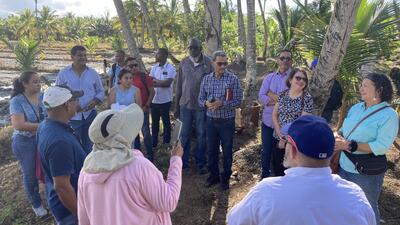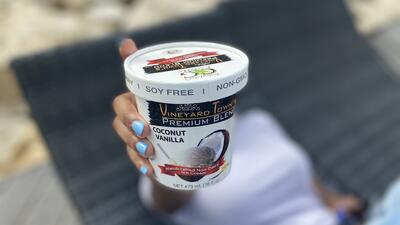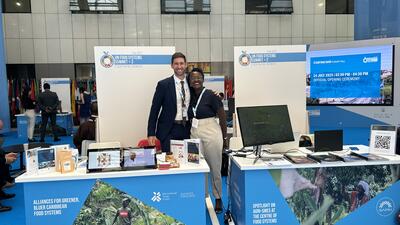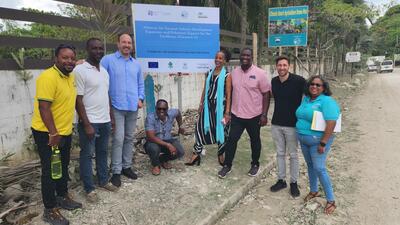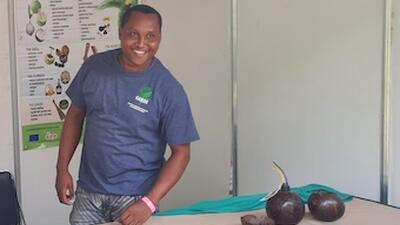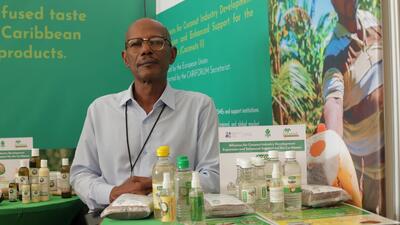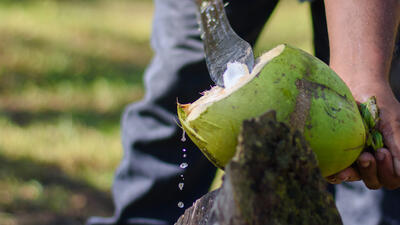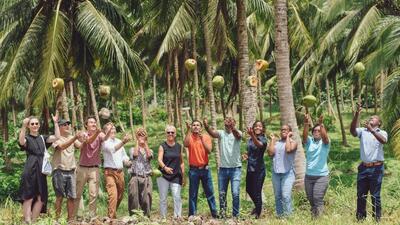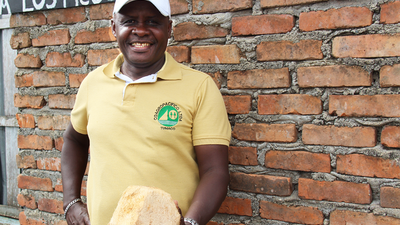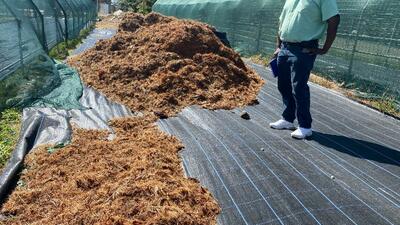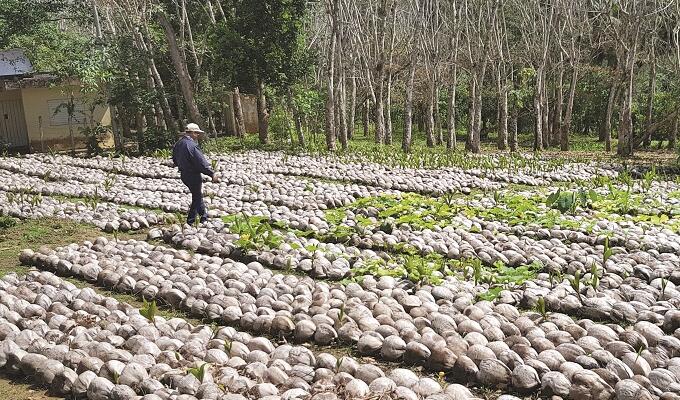

Stories
Alliances for Action: Catalysing investment in the Caribbean coconut industry
1 July 2019
The challenge
Small-scale farmers and businesses in developing countries often struggle to connect to national, regional and international value chains. The result is that even when global demand is high for the crops they grow they fail to benefit in terms of higher incomes, cash flow and more resilient livelihoods.
The coconut sector in the Caribbean is a prime example. Demand for coconut oil, water and other products has been surging on the back of changing consumer lifestyle preferences. A study by ITC and Duke University estimates that sales of organic coconut water alone will more than double to $4.6 billion by 2024. And yet Caribbean coconut farmers have reaped fewer benefits from the boom than competitors in Southeast Asia.
A decades-old vicious circle of low prices, prolonged underinvestment and weak ties to international markets have left the Caribbean coconut industry with ageing, unproductive plantations vulnerable to pests and plant disease, together with limited processing capacity. Resuscitating production requires increasing the supply of high-quality seed nuts and seedlings. Increased production, together with better ties to consumer markets, would help improve incomes for thousands of farmers.
The solution
To revitalize the coconut industry in the Caribbean, ITC and its partners have been working since 2014 to facilitate alliances among actors at every step of the process, from research and development and policymaking through to production, processing and commercialization. The aim is to catalyse investment in ramping up sustainable supply and commercial capacities. The approach, called Alliances for Action, combines technical support and investment with international market connections, leading to more value capture and higher incomes for small-scale coconut farmers and small and mid-sized processors.
To improve sector governance and rectify competitiveness gaps at scale, ITC joined hands with the Caribbean Agricultural Research and Development Institute (CARDI), the African, Caribbean and Pacific Group of States (ACP) and a network of local and regional partners. With financing from the European Union, they together mobilized over 2,000 coconut producers and 450 extension services officers and formed market-led partnerships in 11 countries – Antigua and Barbuda, Barbados, Belize, Dominica, Dominican Republic, Jamaica, Guyana, Saint Lucia, Saint Vincent and the Grenadines, Suriname and Trinidad and Tobago.
At every step of the value chain, policymakers, buyers, researchers and financing institutions are working with farmer-led organizations to reduce risks and align policies to support the expansion of coconut production and commercialization. Since it takes five to eight years for newly planted coconut trees to come online with marketable crops, to create stable income streams in the interim, farmers are being supported to grow locally appropriate alternative crops, such as cocoa, bananas and peppers, and to step up value-added production of coconut water, oil and milk.
The process has involved technical and policy support, such as agricultural extension services for farmers and assistance for processors to meet international health and safety standards.
The results
Four years into implementation, the project’s impacts are visible at three levels: investment, network creation, and technical capacity and training.
Enhancing the long-term economic outlook for the sector has paved the way for new commercial-scale investment into the region’s coconut industry. In Jamaica, partners such as the Coconut Industry Board (CIB), the Scientific Research Council (SRC), the Rural Agricultural Development Authority (RADA), the Development Bank of Jamaica (DBJ) and the Smallholder and Agri-SME Finance and Investment Network (SAFIN) have created a sustainable finance mechanism for smallholder farmers. This has resulted in over $22 million in investment commitments by major firms as well as small local producers and cooperatives such as Barnhill Organics and Swaby’s. In Guyana, $16 million in planned investment will go towards developing new processing facilities for products such as desiccated coconut, coconut oil, and peat made from coconut husks. In the Dominican Republic Bananos Ecológicos de la Línea Noroeste (BANELINO), an organization of family farmers producing Fairtrade-certified organic bananas for export, joined the Alliances for Action network to diversify into coconut production for increased income security and climate resilience.
Alliances among government bodies, big and small businesses, farmers’ groups, private and development finance institutions and the tourism industry have helped improve the business environment and de-risk investment in the Caribbean coconut sector, while ensuring that smallholders’ voices are heard in policymaking processes. Stronger ties between farmers and processors promise to speed the passage of coconuts to markets for value-added products.
Over 2,000 farmers, a quarter of them women, have been trained on sustainable farming techniques, including climate-smart agricultural practices designed to maintain production and incomes in the face of climate change. To amplify the scale of this work, a system of peer learning and knowledge sharing has been established with 600 farmers, who are now better linked to research and extension services, buyers and investors.
Thirty agro-processing firms are also now connected with smallholder farmers and have been trained on meeting international quality and food safety standards, as well as on waste-reducing lean production methods.
The future
With the endorsement of the Caribbean Community Council for Trade and Economic Development and the Caribbean Forum Directorate, ITC and CARDI submitted a proposal to the European Union for a second phase of the project, which would seek to increase its impact and scale, with a stronger focus on climate-smart agriculture, from 2019 to 2023.
Small-scale farmers and businesses in developing countries often struggle to connect to national, regional and international value chains. The result is that even when global demand is high for the crops they grow they fail to benefit in terms of higher incomes, cash flow and more resilient livelihoods.
The coconut sector in the Caribbean is a prime example. Demand for coconut oil, water and other products has been surging on the back of changing consumer lifestyle preferences. A study by ITC and Duke University estimates that sales of organic coconut water alone will more than double to $4.6 billion by 2024. And yet Caribbean coconut farmers have reaped fewer benefits from the boom than competitors in Southeast Asia.
A decades-old vicious circle of low prices, prolonged underinvestment and weak ties to international markets have left the Caribbean coconut industry with ageing, unproductive plantations vulnerable to pests and plant disease, together with limited processing capacity. Resuscitating production requires increasing the supply of high-quality seed nuts and seedlings. Increased production, together with better ties to consumer markets, would help improve incomes for thousands of farmers.
The solution
To revitalize the coconut industry in the Caribbean, ITC and its partners have been working since 2014 to facilitate alliances among actors at every step of the process, from research and development and policymaking through to production, processing and commercialization. The aim is to catalyse investment in ramping up sustainable supply and commercial capacities. The approach, called Alliances for Action, combines technical support and investment with international market connections, leading to more value capture and higher incomes for small-scale coconut farmers and small and mid-sized processors.
To improve sector governance and rectify competitiveness gaps at scale, ITC joined hands with the Caribbean Agricultural Research and Development Institute (CARDI), the African, Caribbean and Pacific Group of States (ACP) and a network of local and regional partners. With financing from the European Union, they together mobilized over 2,000 coconut producers and 450 extension services officers and formed market-led partnerships in 11 countries – Antigua and Barbuda, Barbados, Belize, Dominica, Dominican Republic, Jamaica, Guyana, Saint Lucia, Saint Vincent and the Grenadines, Suriname and Trinidad and Tobago.
At every step of the value chain, policymakers, buyers, researchers and financing institutions are working with farmer-led organizations to reduce risks and align policies to support the expansion of coconut production and commercialization. Since it takes five to eight years for newly planted coconut trees to come online with marketable crops, to create stable income streams in the interim, farmers are being supported to grow locally appropriate alternative crops, such as cocoa, bananas and peppers, and to step up value-added production of coconut water, oil and milk.
The process has involved technical and policy support, such as agricultural extension services for farmers and assistance for processors to meet international health and safety standards.
The results
Four years into implementation, the project’s impacts are visible at three levels: investment, network creation, and technical capacity and training.
Enhancing the long-term economic outlook for the sector has paved the way for new commercial-scale investment into the region’s coconut industry. In Jamaica, partners such as the Coconut Industry Board (CIB), the Scientific Research Council (SRC), the Rural Agricultural Development Authority (RADA), the Development Bank of Jamaica (DBJ) and the Smallholder and Agri-SME Finance and Investment Network (SAFIN) have created a sustainable finance mechanism for smallholder farmers. This has resulted in over $22 million in investment commitments by major firms as well as small local producers and cooperatives such as Barnhill Organics and Swaby’s. In Guyana, $16 million in planned investment will go towards developing new processing facilities for products such as desiccated coconut, coconut oil, and peat made from coconut husks. In the Dominican Republic Bananos Ecológicos de la Línea Noroeste (BANELINO), an organization of family farmers producing Fairtrade-certified organic bananas for export, joined the Alliances for Action network to diversify into coconut production for increased income security and climate resilience.
Alliances among government bodies, big and small businesses, farmers’ groups, private and development finance institutions and the tourism industry have helped improve the business environment and de-risk investment in the Caribbean coconut sector, while ensuring that smallholders’ voices are heard in policymaking processes. Stronger ties between farmers and processors promise to speed the passage of coconuts to markets for value-added products.
Over 2,000 farmers, a quarter of them women, have been trained on sustainable farming techniques, including climate-smart agricultural practices designed to maintain production and incomes in the face of climate change. To amplify the scale of this work, a system of peer learning and knowledge sharing has been established with 600 farmers, who are now better linked to research and extension services, buyers and investors.
Thirty agro-processing firms are also now connected with smallholder farmers and have been trained on meeting international quality and food safety standards, as well as on waste-reducing lean production methods.
The future
With the endorsement of the Caribbean Community Council for Trade and Economic Development and the Caribbean Forum Directorate, ITC and CARDI submitted a proposal to the European Union for a second phase of the project, which would seek to increase its impact and scale, with a stronger focus on climate-smart agriculture, from 2019 to 2023.






